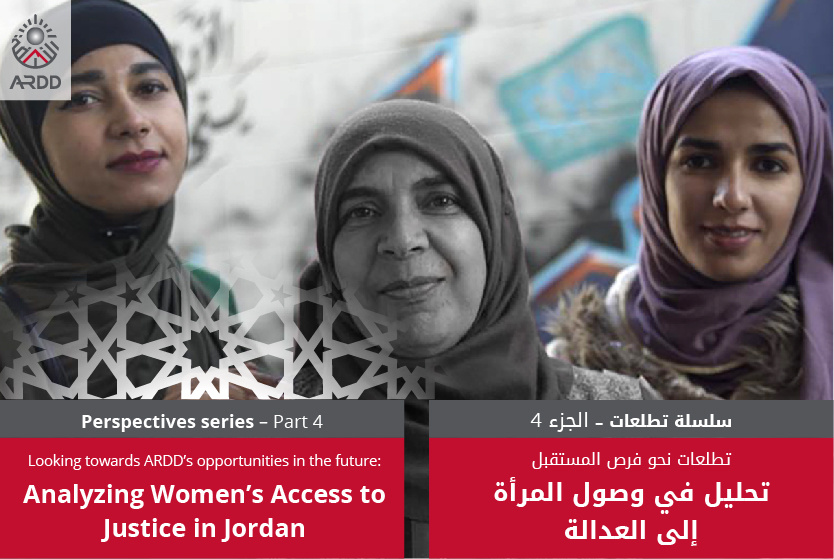Challenges to women’s access to justice are considered one of the main reasons for the prevalence of economic violence against women. This was made evident by the 4th Perspective paper titled “Analyzing Women’s Access to Justice” which was launched as part of the Arab Renaissance of Democracy and Development (ARDD)’s participation in the National Campaign “16 Days of Activism against Gender-Based Violence” calling to stop economic violence against women.
As part of ARDD’s efforts to promote the rule of law and facilitate access to justice for all individuals in Jordan and the Arab region, this report seeks to understand and address the many levels and complexities related to women’s access to justice within the framework of gender justice, which also includes political ,social and economic justice.
Denying women access to justice allows economic violence in all its forms from restriction, discrimination against women and exclusion to prevail. Although Jordan has taken a number of steps to promote women’s participation in politics by reforming the legal and institutional framework – such as the establishment of the Jordanian National Commission for Women – and ratifying international conventions that support gender equality, cultural stigma and the need to formalize women’s rights constitute obstacles to women to obtain a political identity that allows her equal access to justice.
This paper also calls for the study of the framework of different ways in which the law is dealt with, including legal instruments related to employment, social security, marriage, economic participation, health, education, citizenship, etc., and how it is also formulated by analyzing women’s access to justice based on the six fundamental principles. These are litigation, access to the justice system, availability and quality of services, meaningful remedies, and accountability of the justice system, which make out ARDD’s framework of inquiry.
Further, this paper aims to shed insight into the nature of women’s engagement with the justice system and aims to identify gaps from a variety of different perspectives. Within the analysis, reference is made to ARDD’s surveys, with Jordanians and Syrian refugees, on public perceptions and satisfaction regarding the justice system through four main dimensions: navigability, affordability, timeliness, and fairness.
While the surveys showed some similarities between men and women, upon closer analysis, gendered differences are observed in relation to these dimensions. The outcomes present further insight into the differences between perception (of those who have not engaged with the justice system or a specific component of it) and satisfaction (of those who have experience with the justice system or a specific component of it). Essentially, this difference can be seen as a potential deterrent factor to access the justice system, and could be mitigated through awareness raising and facilitated access to information.
In terms of refugees access to justice – and women refugees, in particular, this paper highlights that refugees currently residing in Jordan face many of the same issues faced by the local community in terms of access to justice, these are often exacerbated by other issues such as a lack of awareness, being unable to afford legal services, and the prioritization of things regarded as necessities over legal issues. This reaffirms the importance of working towards access to justice for refugees through both the facilitation of prompt and adequate access to legal information, and through directly increasing their access to justice through legal aid services. In terms of Syrian refugee women, in particular, key findings include the reality that Syrian refugee women are less likely than their male counterparts to pursue legal action, or even alternative dispute resolution methods, among others, due to reported sociocultural pressures, such as the culture of ‘aib’ (culture of shame).
Furthermore, challenges relating to women’s access to justice at the individual, community and institutional/structural level are identified. These levels of challenges can be understood by analyzing the various aspects of the functionality of government, civil society, and policy frameworks. In this respect, when personal status laws are analyzed in parallel to penal codes, the unequal treatment of women becomes increasingly evident, especially in terms of provisions related to honor crimes, rape, and adultery.
ARDD argues for the establishment of an enabling environment as essential to women’s access to justice. For ARDD, an enabling environment refers to full range of socio-cultural, political, or economic conditions in a society that enable or hinder access to justice.
One of these approaches is the pursuit of effective adoption and revision of national legal instruments in line with international human rights standards, bearing in mind the economic implications related to the status of women.
Another key component is the strengthening of trust between justice institutions and persons of concern. In addition, while equally important and relevant, sensitization to remove restrictive social norms is perhaps the most complex component of establishing an enabling environment for women’s access to justice.
ARDD reaffirms that it is important to empower instruments of the justice system in terms of communication and outreach in order to effectively engage women.
Ultimately, through effective solidarity and partnerships and effective engagement on the political, legal, and economic levels, the feasibility of achieving an enabling environment by expanding and enhancing women’s access to justice can be increased. Additionally, both the limited availability and low accessibility of legal aid indicates that the institutional legal aid system in Jordan needs further support and expansion to be able to meet the needs of women and people in Jordan.
Throughout ARDD’s experience in the Regional Women’s Access to Justice, there were clear findings on the core relationship between the political identity of women and their ability to access to Justice. Further, and in line with the UN’s Women, Peace, and Security agenda, ARDD stresses that women’s full participation is critical to achieving and sustaining peace and stability within a community – and that this participation is also an undeniable component of women’s access to justice.
More research is needed to build analysis on this, and on how religion, economy, and politics are central components of the reality of access to justice for women.


